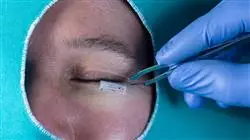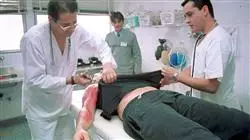University certificate
Accreditation/Membership
The world's largest faculty of nursing”
Introduction to the Program
Prepare yourself to achieve success in your profession and help save lives. We offer you the most updated knowledge and the latest scientific evidence in COVID-19"

Emergency health care is an essential element in a health system and must guarantee quality treatment and continuity in the care that people receive. Primary care is the gateway to the health system, often receiving patients with potentially serious conditions that require immediate and complex treatment, often accompanied by minimal resources.
Taking into account the large number of hours a day that Primary Care (PC) nurses are available to attend to emergencies; the importance of these, the current demands of patients and of professionals themselves to perform higher quality work, more than justifies the fact that PC nurses today can and should intervene in all emergencies that may arise, regardless of the level of severity.
This program includes the rules of action for the main urgent conditions that can be found in the treatment room on a regular basis and will be able to help doctors make swift and accurate decisions. Its teaching staff includes healthcare professionals from the field of Primary Care, who bring their work experience to this program, as well as renowned emergency physicians and other specialists.
The program also includes the participation of two prominent international leaders in Primary Care Emergency Medicine. These experts, thanks to their extensive experience, will each give 10 exclusive Masterclasses, which will examine in depth the most recent innovations and progress, in this particular area, and will allow the graduate to update their knowledge and skills with all the TECH quality guarantees.
All knowledge is presented through high quality multimedia content, expert clinical case analyses, masterclasses and video techniques that allow the exchange of knowledge and experience, maintain and update the educational level of its members, create protocols for action and disseminate the most important new developments.
Take advantage of this unique opportunity and get access to a set of additional Masterclasses, offered by two internationally recognized experts in Primary Care Emergency Medicine"
This Master's Degree in Primary Care Emergencies for Nursing contains the most complete and up-to-date scientific program on the market. Its most notable features are:
- Developing practical cases presented by experts in Emergencies in Primary Care
- The graphic, schematic, and practical contents with which they are created provide scientific and practical information on the disciplines that are essential for professional practice
- The latest in Emergencies in Primary Care
- Practical exercises where self-assessment can be used to improve learning
- Emphasis on innovative methodologies in Emergencies in Primary Care
- Theoretical lessons, questions to the expert, debate forums on controversial topics, and individual reflection assignments
- Content that is accessible from any fixed or portable device with an Internet connection
This program is the best investment you can make in the selection of a refresher program to update your knowledge in Primary Care Emergency Medicine"
The program’s teaching staff includes professionals from the sector who contribute their work experience to this educational program, as well as renowned specialists from leading societies and prestigious universities.
The multimedia content, developed with the latest educational technology, will provide the professional with situated and contextual learning, i.e., a simulated environment that will provide immersive education programmed to learn in real situations.
This program is designed around Problem-Based Learning, whereby the professional must try to solve the different professional practice situations that arise during the academic year For this purpose, the students will be assisted by an innovative interactive video system created by renowned and experienced experts.
Increase your decision-making confidence by updating your knowledge through this Master's Degree"

We offer you the most up-to-date content, the best teaching methodology, and an innovative interactive video system that will help you in your studies"
Why study at TECH?
TECH is the world’s largest online university. With an impressive catalog of more than 14,000 university programs available in 11 languages, it is positioned as a leader in employability, with a 99% job placement rate. In addition, it relies on an enormous faculty of more than 6,000 professors of the highest international renown.

Study at the world's largest online university and guarantee your professional success. The future starts at TECH”
The world’s best online university according to FORBES
The prestigious Forbes magazine, specialized in business and finance, has highlighted TECH as “the world's best online university” This is what they have recently stated in an article in their digital edition in which they echo the success story of this institution, “thanks to the academic offer it provides, the selection of its teaching staff, and an innovative learning method aimed at educating the professionals of the future”
A revolutionary study method, a cutting-edge faculty and a practical focus: the key to TECH's success.
The most complete study plans on the university scene
TECH offers the most complete study plans on the university scene, with syllabuses that cover fundamental concepts and, at the same time, the main scientific advances in their specific scientific areas. In addition, these programs are continuously being updated to guarantee students the academic vanguard and the most in-demand professional skills. In this way, the university's qualifications provide its graduates with a significant advantage to propel their careers to success.
TECH offers the most comprehensive and intensive study plans on the current university scene.
A world-class teaching staff
TECH's teaching staff is made up of more than 6,000 professors with the highest international recognition. Professors, researchers and top executives of multinational companies, including Isaiah Covington, performance coach of the Boston Celtics; Magda Romanska, principal investigator at Harvard MetaLAB; Ignacio Wistumba, chairman of the department of translational molecular pathology at MD Anderson Cancer Center; and D.W. Pine, creative director of TIME magazine, among others.
Internationally renowned experts, specialized in different branches of Health, Technology, Communication and Business, form part of the TECH faculty.
A unique learning method
TECH is the first university to use Relearning in all its programs. It is the best online learning methodology, accredited with international teaching quality certifications, provided by prestigious educational agencies. In addition, this disruptive educational model is complemented with the “Case Method”, thereby setting up a unique online teaching strategy. Innovative teaching resources are also implemented, including detailed videos, infographics and interactive summaries.
TECH combines Relearning and the Case Method in all its university programs to guarantee excellent theoretical and practical learning, studying whenever and wherever you want.
The world's largest online university
TECH is the world’s largest online university. We are the largest educational institution, with the best and widest online educational catalog, one hundred percent online and covering the vast majority of areas of knowledge. We offer a large selection of our own degrees and accredited online undergraduate and postgraduate degrees. In total, more than 14,000 university degrees, in eleven different languages, make us the largest educational largest in the world.
TECH has the world's most extensive catalog of academic and official programs, available in more than 11 languages.
Google Premier Partner
The American technology giant has awarded TECH the Google Google Premier Partner badge. This award, which is only available to 3% of the world's companies, highlights the efficient, flexible and tailored experience that this university provides to students. The recognition as a Google Premier Partner not only accredits the maximum rigor, performance and investment in TECH's digital infrastructures, but also places this university as one of the world's leading technology companies.
Google has positioned TECH in the top 3% of the world's most important technology companies by awarding it its Google Premier Partner badge.
The official online university of the NBA
TECH is the official online university of the NBA. Thanks to our agreement with the biggest league in basketball, we offer our students exclusive university programs, as well as a wide variety of educational resources focused on the business of the league and other areas of the sports industry. Each program is made up of a uniquely designed syllabus and features exceptional guest hosts: professionals with a distinguished sports background who will offer their expertise on the most relevant topics.
TECH has been selected by the NBA, the world's top basketball league, as its official online university.
The top-rated university by its students
Students have positioned TECH as the world's top-rated university on the main review websites, with a highest rating of 4.9 out of 5, obtained from more than 1,000 reviews. These results consolidate TECH as the benchmark university institution at an international level, reflecting the excellence and positive impact of its educational model.” reflecting the excellence and positive impact of its educational model.”
TECH is the world’s top-rated university by its students.
Leaders in employability
TECH has managed to become the leading university in employability. 99% of its students obtain jobs in the academic field they have studied, within one year of completing any of the university's programs. A similar number achieve immediate career enhancement. All this thanks to a study methodology that bases its effectiveness on the acquisition of practical skills, which are absolutely necessary for professional development.
99% of TECH graduates find a job within a year of completing their studies.
Master's Degree in Primary Care Emergencies for Nursing
Taking into account that the care and performance in health emergencies is one of the pillars by which the proper functioning of health systems is evaluated, TECH Global University designed this Master's Degree with which the nurse will have the opportunity to strengthen their skills and abilities in daily medical practice, facing urgent pathological situations, usual or exceptional, with skill and precision. The Master's Degree includes in its syllabus the plans and rules of systematized action in the most frequent emergencies and, at the same time, the presentation of not so common situations, which makes it possible for the nurse to respond and adapt to all kinds of circumstances with ease and skill, whatever the level of severity. In addition, it offers updated information and knowledge regarding the risky infectious diseases that afflict the world's population today, such as the coronavirus.
Postgraduate Degrees in Nursing
By studying a postgraduate degree in Nursing, you will be able to apply the newly acquired concepts in daily clinical practice, since they are designed following an innovative pedagogical method that allows you to internalize and apply the knowledge in a natural and functional way. As such, you will update your knowledge in different areas of Nursing and Emergency in Primary Care, focusing on the definition of diagnostic criteria, the identification of signs and symptoms of the patient, the correct interpretation of alterations, the application of appropriate measures to treat the patient and the management of frequently used drugs. With a postgraduate degree in TECH you will acquire greater agility and self-confidence when facing medium and high risk medical situations that affect patients.







